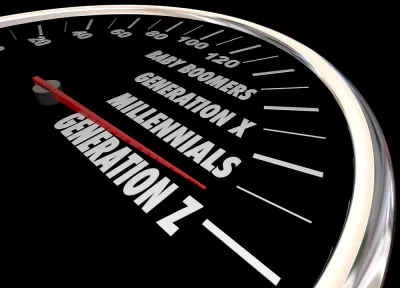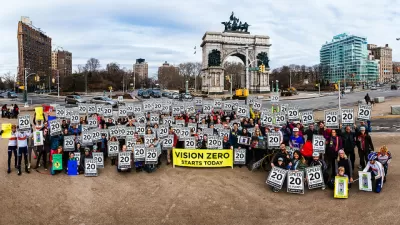Think Generation Z will usher in the long-awaited post-car future of transit advocates’ dreams? Think again (about the example set by the Millennials).

Generation Z is driving less than their predecessors, according to several recent reports. Only 25 percent of U.S. 16-year-olds earned driver’s licenses in 2020—down from 40 percent in 1997, according to data from the Federal Highway Administration data analyzed by Green Car Congress and cited in an article by Taylor Penley in February. Additional articles by The Economist and the Washington Post picked up on the theme during the same week.
David Zipper, writing for Bloomberg CityLab, wants everyone to pause before starting to plan for a future defined by Zoomers without cars:
Despite the fond hopes of many urban planners and mobility advocates (as well as some journalists), generational preferences are no match for decades of autocentric development that all but force most US residents to drive, even if they would prefer not to.
Zipper cites a recent example for clues to how this story will unfold. Those with a memory back to the Great Recession will remember the narrative about “peak car” that was popular a decade ago, as Millennials flocked to cities and embraced biking and transit. Millennials grew up, and subsequently moved to more suburban locations in search of more space for hybrid work schedules and growing families. As described by Zipper, the “peak car” narrative was a temporary mirage, created by the general lack of affordability—a problem that still exists for the next generation today.
If the next generation won’t reverse the direction of car culture, what will? Zipper provides his answer:
If we want to untether society from its reliance on automobiles, we cannot avoid the difficult work of building places that don’t need them. That requires increasing density and investing in transit and bike lanes — which lets people have real choices about how they travel. Generational shifts might provide a tailwind, but without major policy reforms, today’s car-wary teens will become tomorrow’s daily drivers.
Since it will take a lot of work to overcome the effects of decades of car-centric planning in the United States, I would suggest one more prescription for the list: building more housing and amenities the suit the needs of families in urban areas. I’m not talking about single-family residential; I mean multi-family buildings with space for multiple generations, access to jobs, and proximity to high-quality, frequent transit. In fact, family-friendly neighborhoods might be as critical, if not more critical, to the long-term viability of car-free lifestyles as any of the other popular buzzwords, like the 15-Minute City or Walkable Urban Places.
FULL STORY: Gen Z’s Turn Against Driving Is a Mirage

Alabama: Trump Terminates Settlements for Black Communities Harmed By Raw Sewage
Trump deemed the landmark civil rights agreement “illegal DEI and environmental justice policy.”

Study: Maui’s Plan to Convert Vacation Rentals to Long-Term Housing Could Cause Nearly $1 Billion Economic Loss
The plan would reduce visitor accommodation by 25% resulting in 1,900 jobs lost.

Planetizen Federal Action Tracker
A weekly monitor of how Trump’s orders and actions are impacting planners and planning in America.

Wind Energy on the Rise Despite Federal Policy Reversal
The Trump administration is revoking federal support for renewable energy, but demand for new projects continues unabated.

Passengers Flock to Caltrain After Electrification
The new electric trains are running faster and more reliably, leading to strong ridership growth on the Bay Area rail system.

Texas Churches Rally Behind ‘Yes in God’s Back Yard’ Legislation
Religious leaders want the state to reduce zoning regulations to streamline leasing church-owned land to housing developers.
Urban Design for Planners 1: Software Tools
This six-course series explores essential urban design concepts using open source software and equips planners with the tools they need to participate fully in the urban design process.
Planning for Universal Design
Learn the tools for implementing Universal Design in planning regulations.
Caltrans
Smith Gee Studio
Institute for Housing and Urban Development Studies (IHS)
City of Grandview
Harvard GSD Executive Education
Toledo-Lucas County Plan Commissions
Salt Lake City
NYU Wagner Graduate School of Public Service





























